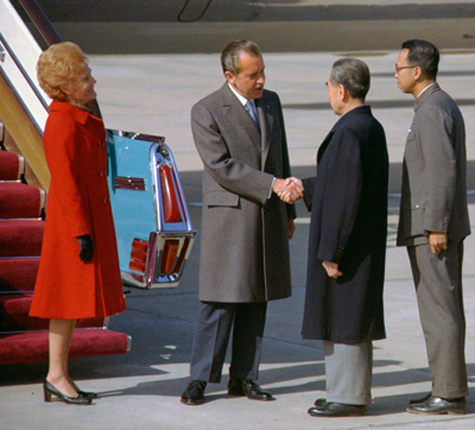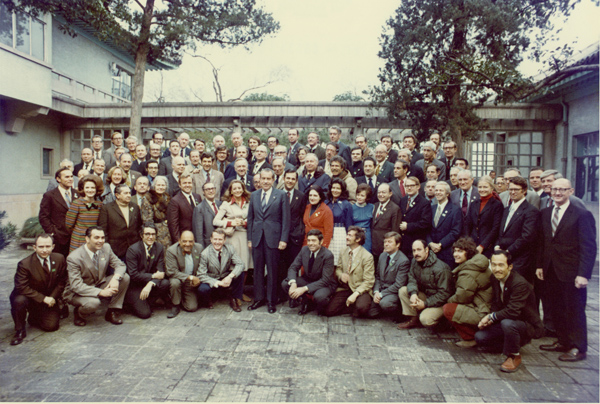The Shanghai Communiqué: a journalist's story
- By Jonathan Calkins
 0 Comment(s)
0 Comment(s) Print
Print E-mail China.org.cn, February 20, 2012
E-mail China.org.cn, February 20, 2012
|
|
|
President Richard Nixon and Premier Zhou Enlai shake hands in Beijing in February 1972. This was the first time a US President had visited the People's Republic of China. [Photo courtesy of White House] |
In light of the upcoming 40th anniversary of official diplomatic relations between the People's Republic of China and the United States, the Foreign Correspondents' Club of China (FCCC) screened a one-hour documentary on Feb. 16 titled "Assignment: China, The Week that Changed the World." The documentary describes the experiences of the U.S. journalists who accompanied President Nixon on his historic trip to China in February 1972. The FCCC is the professional association of Beijing-based journalists reporting on China for audiences around the world.
|
|
|
Nixon (center) surrounded by the White House press-corps. Then Secretary of State Henry Kissinger joked with Premier Zhou Enlai that the US was invading China with a media army. [Photo courtesy of White House] |
Established by the U.S.-China Institute of the University of Southern California Annenberg School of Journalism and Communication, "Assignment: China" examines the American news media's impact on Americans' perceptions of China since the 1940s. According to the U.S.-China Institute, two "Assignment: China" segments are currently available. Two more are near completion and principal interviews have been prepared for the remaining segments.
The documentary screened on Feb. 16 was reported and narrated by U.S-China Institute Senior Fellow Mike Chinoy, formerly CNN's Senior Asia Correspondent and Beijing Bureau Chief. The screening was followed by a discussion with the filmmaker, Melinda Liu (Beijing Bureau Chief of Newsweek/The Daily Beast), Keith Richburg (Beijing Bureau Chief of the Washington Post) and Jaime FlorCruz (Beijing Bureau Chief of CNN).
Jaime FlorCruz, a native of the Philippines, was on a three-week tour of China in August 1971 when then-Philippine President Ferdinand Marcos began jailing his political opponents. An outspoken critic of the Marcos regime, Mr. FlorCruz feared what would happen if he returned to the Philippines. Unable to return home, his passport expired the following year and he was forced to stay in China for the next 12 years (1971-1983). He recalled hearing the Chinese government's official radio announcement that President Nixon had arrived in China. He said: "I was working on a farm, and I remember that I was working alongside my fellow Chinese farmers, thinking how incredible it was that Nixon was in Beijing."
To be sure, Nixon's visit to China forever changed the global political landscape. Although the U.S.-China relationship has never been trouble-free, the actions taken by senior U.S. and Chinese officials in 1972 helped normalize diplomatic relations between the two countries, creating a foundation for future dialogue and political exchange.
"Assignment: China" also discussed the rise of television media and its growing role as the preferred vehicle of information distribution to mass audiences. President Nixon wanted the American people to see China, not just read about it. Stanley Karnow (Washington Post), one of the 87 journalists who accompanied the President on his trip, said in the documentary: "What Nixon really wanted was a television extravaganza. He didn't want print reporters. He didn't care about print reporters. He cared about television. He wanted a television extravaganza."
Also speaking in the documentary, Barbara Walters (NBC News) summed up the media's role in helping to shape public opinion. She said: "And this is what is important. It changed our views of China, but it also changed China's view of the U.S."







